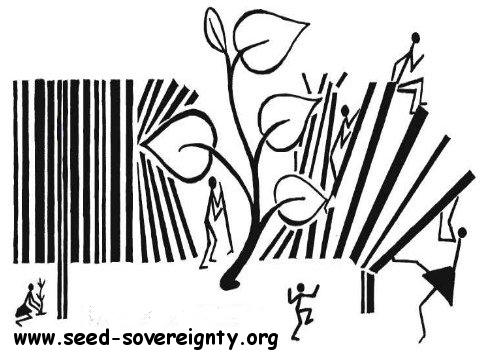
The Campaign for Seed-Sovereignty is an initiative of the European Civic Forum and the German „BUKO-Campaign against biopiracy“ and is connecting seed activists and farmers in Germany, Austria, France and Suisse. It is working together with like-minded organizations and individuals in these and other European countries.
Campaign for Seed-Sovereignty
Seeds must remain part of the Commons!
Some 150.000 people are supporting our petition „Seed diversity under threat“
 The
petition is closed now, six months after launching it. This is due
to the proceedings of the used petition platform „open
petition“
The
petition is closed now, six months after launching it. This is due
to the proceedings of the used petition platform „open
petition“
The result of subscriptions:
95028 for the
German
petition
23080 for the Czech
petition
9460 for the English
petition
4300 for the Hungarian
petition
3552 for the Slovenian
petition
2904 for the Portuguese
petition
1984 for the Croatian
petition
1636 for the Romanian
petition
1634 for the Swedish/German
petition
1364 for the French
petition
982 for the Latvian
petition
963 for the Dutch
petition
644 for the Danish
petition
and
some others
All
the
subscribers supported
our statement: “The
currently available texts for the new EU seed regulation will
promote a concentration of the seed market into the hands of a
small number of seed industry corporations. This is unacceptable.
A new EU seed regulation must allow diversity varieties, varieties
for small-scale farming and ecologically adapted breeding. Diverse
varieties must be available not only in gene banks, but on the
open market too, without any bureaucratic restrictions.“
The
best way to allow diverse varieties on the open market is to make
a shift from a compulsory system of registration and certification
to a voluntary one.
![]() Proposal
of the EU commission
for
a regulation on seeds and other plant propagating material
Proposal
of the EU commission
for
a regulation on seeds and other plant propagating material
![]() Press
release of “Arche Noah”
on
the proposal of the EU commission
Press
release of “Arche Noah”
on
the proposal of the EU commission
The Latest in the Battle to Reform EU Seed Laws (2013-02-24)

![]() ALERT:
Bad new EU-seed law ahead!
ALERT:
Bad new EU-seed law ahead!
The
DG SANCO (Directorate General for Health and Consumers) of the
EU-Commission is working on a revision of the EU Seed Laws,
currently a series of directives interpreted under national law,
to be replaced by a single regulation that will come into force
directly in all the 27 EU member states without local
interpretation. This would suit the needs of seed multinationals
which want uniform laws in all their markets, but would harm the
diverse structures of agriculture and the diverse use and
production of seeds. If you want to act on behalf of
seed-sovereignty, for farmers and seed-savers, you have to become
active in the coming months!
Diversity
under attack!
The
current draft of the proposed regulation, from Nov. 2012,
contains some draconian measures for farm-based production seeds,
and diversity of plant varieties. Farmers as seed producers would
be subject to the same obligations of registration and regulation
as multinational seed company operators. Varieties of
diversity and old varieties would be endangered, and the
free exchange of seeds and other propagation material could
effectively be forbidden. If varieties have to be registered and
to pass extensive testing, this would put up unreasonably high
barriers for farmers, consumers and the diversity in agriculture
and horticulture.
The European Seed Association, lobby
organisation of the seed multinationals, has two main aims. First
to control the niche markets and make them unattractive, and
second to register all producers of farm saved seed in order to
collect royalties from them. They are also trying to combine the
testing and evaluation for plant variety protection (PVP) and the
licensing for marketing, and to privatize the entire process. This
would hit the small companies and farmers, who would face
increasing and unreasonable testing and evaluation costs, for each
single variety of seed they wish to use.
What‘s
next?
The
current draft regulation was written by DG SANCO. Before it
becomes an official proposal of the EU-Commission, DG AGRI
(Directorate General of Agriculture and Rural Development) and the
DG ENVI (Directorate General for the Environment) have to agree to
it‘s contents. At the moment there are several points of
disagreement.
This opens a window we should use to struggle for
more diversity, for open pollinated varieties (versus ”hybrid”
varieties), and for more diverse seeds in the hands of farmers,
gardeners and seed savers.
Our demands for a new EU seed law:
•No regulation of seed exchange by seed savers and farmers!
•No mandatory registration or certification for open pollinated varieties!
